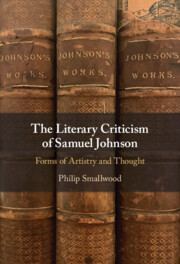Book contents
- The Literary Criticism of Samuel Johnson
- The Literary Criticism of Samuel Johnson
- Copyright page
- Dedication
- Epigraph
- Contents
- Preface
- Acknowledgments
- Abbreviations
- Introduction
- Part I Johnson’s Criticism and the Forms of Feeling
- Part II Critical Relations and the Art of Literary History
- Part III Johnson, Dramatic Poetry and Thinking
- Chapter 5 Shakespeare, Johnson and Philosophy
- Chapter 6 Two Ways of Being Wise
- Part IV Time, Truth and History
- Part V Editing Lives, and Life
- Appendix Irony in Revolt: F. R. Leavis Reads Johnson
- Bibliography
- Index
Chapter 6 - Two Ways of Being Wise
Johnson, Philosophy and Montaigne
from Part III - Johnson, Dramatic Poetry and Thinking
Published online by Cambridge University Press: 07 September 2023
- The Literary Criticism of Samuel Johnson
- The Literary Criticism of Samuel Johnson
- Copyright page
- Dedication
- Epigraph
- Contents
- Preface
- Acknowledgments
- Abbreviations
- Introduction
- Part I Johnson’s Criticism and the Forms of Feeling
- Part II Critical Relations and the Art of Literary History
- Part III Johnson, Dramatic Poetry and Thinking
- Chapter 5 Shakespeare, Johnson and Philosophy
- Chapter 6 Two Ways of Being Wise
- Part IV Time, Truth and History
- Part V Editing Lives, and Life
- Appendix Irony in Revolt: F. R. Leavis Reads Johnson
- Bibliography
- Index
Summary
This chapter extends philosophical comparison to Montaigne, whose first translator, Florio, was Shakespeare’s friend. The chapter focusses on likenesses and unlikenesses, but brings out a common wisdom. There are confluences of nature and taste. Both find pleasure the central motivation for literary study. Their essays take different forms but assert Reason’s instability; Montaigne’s array of topics remains prescient of Johnson’s. Thus, the “ondoyant et divers” qualities of Montaigne are reflected in the “mingled” drama Johnson attributed to Shakespeare; likewise, the Johnsonian flux of experience links Johnson’s Rasselas with Montaigne’s “Of Experience.” The tendency of Imagination to dominate reason recalls, similarly, Montaigne’s “Apology for Raimond de Sebonde.” The effort to live according to nature is defeated by nature. The chapter concludes with discussion of the Lives. Montaigne’s sense of the random and various ways by which life comes to an end anticipates Johnson’s accounts of the deaths of the poets.
Keywords
- Type
- Chapter
- Information
- The Literary Criticism of Samuel JohnsonForms of Artistry and Thought, pp. 111 - 126Publisher: Cambridge University PressPrint publication year: 2023

